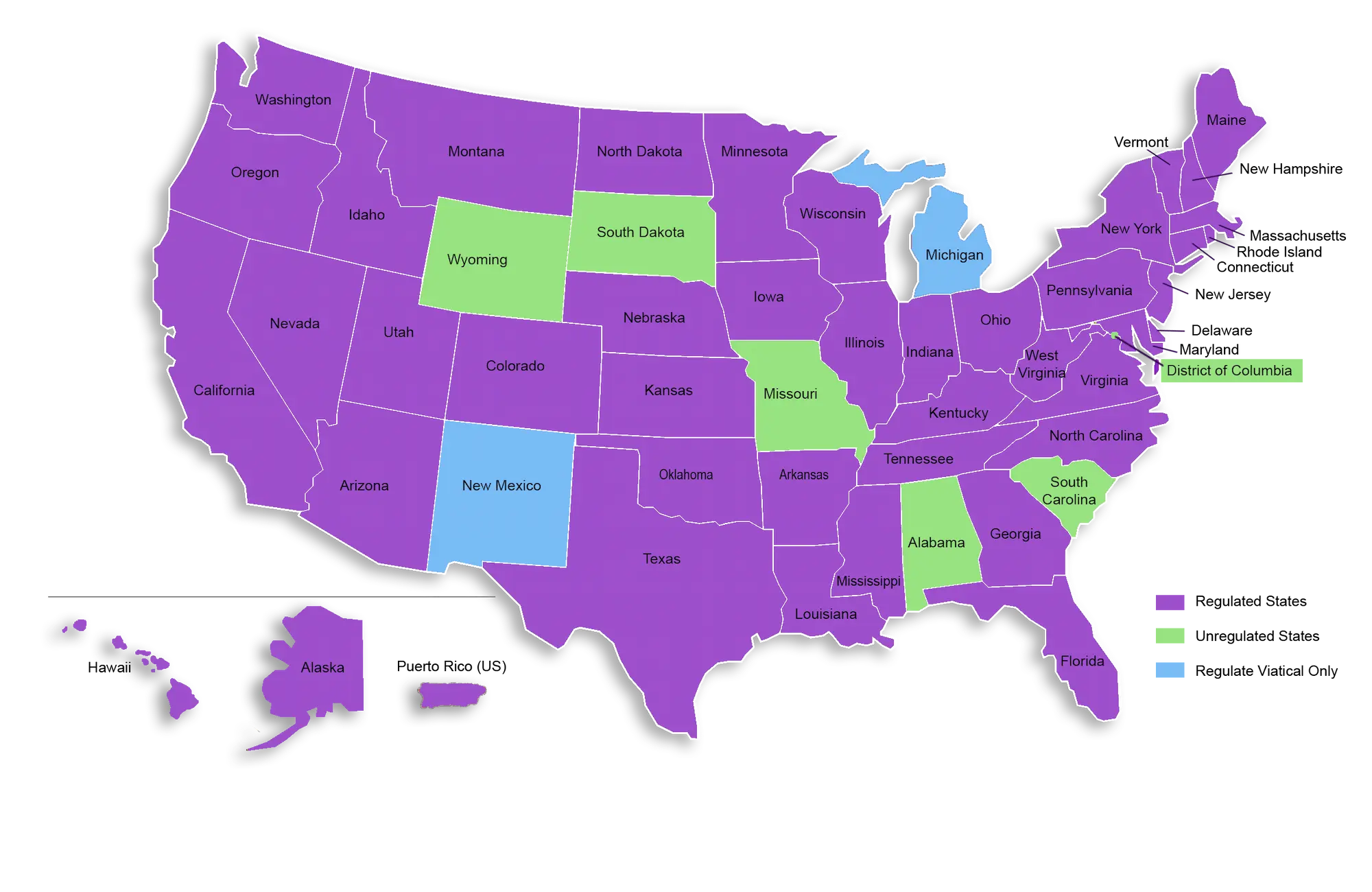Privacy Policy
- Definitions and interpretation
- Information about Us
- What does this policy cover?
- Data collected
- Our use of Data
- Your Data and Your rights
- Users' right to withdraw consent
- Your right to withhold information
- Accessing your own Data
- How You can control Your Data
- Third Party websites and services
- Changes of business ownership and control
- Security
- Cookies and Web Beacons
- Contacting Us
- Changes to this Privacy Policy
1. Definitions and interpretation
In this Privacy Policy the following terms shall have the following meanings:
"Account"
collectively, the personal information, payment information and credentials used by Users to access material and/or any communications System on the Website or
provided to Us for communication with You.
"CG Analysts Ltd (CGA)"
CG Analysts Ltd ("CGA"), a company incorporated under the laws of England and Wales with registered number 7187170.
“Life Policy Auctions (LPA)”
A website with URL at 'https://www.lifepolicyauctions.com developed for the purchase and sale of life insurance (life settlement) policies.
"Cookie"/"Cookies"
a small text file placed on Your computer when You visit certain parts of this Website. This allows Us to identify recurring visitors from new visitors and
to analyze their browsing habits within the Website. Where e-commerce facilities are provided, cookies may be used to store Your shopping basket. Further details are contained in
Clause 14 of this Privacy Policy.
"Cookie Law"
means the relevant parts of the Privacy and Electronic Communications (EC Directive) Regulations 2003.
"Personal Data"/“Data”
means all information that You submit and all data that relates to an identifiable person who can be directly or indirectly identified from that data. In this case, it means personal data that
You give to Us via Our Website. This definition shall, where applicable, incorporate the definitions provided in the UK Data Protection Act 2018 (DPA 2018), the UK General Data Protection
Regulation (UK GDPR) and the EU Regulation 2016/679 – the General Data Protection Regulation (“EU GDPR”). This includes, but is not limited to, Account details and information submitted using
any of Our Services or Systems.
“Service”/“Services”
collectively, any online facilities, tools, services or information that We make available through the Website either now or in the future.
“System”/“Systems”
any online communications infrastructure that We make available through the Website either now or in the future. This includes, but is not limited to, web-based email, message boards, live chat
facilities, subscription forms and email links.
“Third Party”/“Third Parties”
any person or entity which is not an employee or member of CGA, or its affiliates or its subsidiaries.
“User”/“Users”/“You”/“Your”
any Third Party that accesses the Website and is not employed by CGA, or its affiliates or its subsidiaries.
“We”/“Our”/“Us”
refers to CGA.
“Web Beacon”
a small transparent image file (usually only 1-pixel x 1-pixel in size) which is used for tracking behavior and activity in emails that We may send You from time to time.
“Website”
https://www.lifepolicyauctions.com and any sub-domains of this Website unless expressly excluded by their own terms and conditions.
CG Analysts Ltd (CGA) respects the right to privacy of every individual who visits or uses Our Websites, mobile Websites, any of Our apps or portals, or who otherwise communicates with Us,
uses Our products or receives services from Us. This privacy policy explains how We use any personal information We collect from You and Your rights to access, correct or request the removal of,
Your personal data.
2. Information About Us
2.1
Our Website is owned and operated by the CG Analysts (CGA) - registered number 7187170.
2.2
CGA is registered under the Data Protection Act 2018 under registration number ZA042073. The Data Protection Officer is Sue Bates who can be contacted by email at
s.bates@cganalysts.com, by telephone on +44 (0)1473 226106 or by post.
2.3
Our registered office is at 3rd Floor, St Vincent House, 1 Cutler Street, Ipswich, IP1 1UQ, United Kingdom.
3. What Does This Policy Cover?
3.1
This Privacy Policy applies as between You and CG Analysts Ltd ("CGA"), the owner and provider of this Website. This Privacy Policy applies to Our use of any and all Data collected by Us in
relation to Your use of CGA Websites and any Services or Systems therein and any and all Data collected by Us from You via any of the following services:
- Any of Our Websites that link to this Privacy Policy
- Any of Our social media platforms
- Any of Our mobile apps
- Any Data provided by You to Us by telephone, SMS, email or in any other form of correspondence or in person
3.2
This Privacy Policy does not extend to any websites that are linked to from Our Website (whether We provide those links or whether they are shared by other users). We have no control over how
Your Data is collected, stored or used by other websites and We advise You to check the privacy policies of any such websites before providing any Data to them.
4. Data collected
4.1
Without limitation, any of the following Data may be collected:
- 4.1.1 name;
- 4.1.2 date of birth;
- 4.1.3 gender;
- 4.1.4 job title;
- 4.1.5 profession;
- 4.1.6 company name;
- 4.1.7 contact information such as email addresses and telephone numbers;
- 4.1.8 demographic information such as post code, preferences and interests;
- 4.1.9 IP address (automatically collected);
- 4.1.10 web browser type and version (automatically collected);
- 4.1.11 operating system (automatically collected);
- 4.1.12 a list of URLs starting with a referring site, Your activity on this Website, and the website You exit to (automatically collected);
- 4.1.13 email client;
- 4.1.14 computer or device information; and
- 4.1.15 Cookie information (see Clause 14 below).
4.2
We do not collect or store any credit card details.
4.3
We are the sole recipient of Users’ Data and We do not transfer Data to third countries or international organizations outside the EEA. If the transfer of Users’ Data outside the EEA is
envisaged, We will make every effort to contact Users before the transfer is made.
5. Our use of Data
5.1
We do not keep Your personal Data for any longer than is necessary in light of the reason(s) for which it was first collected. Data that You may submit through any communications System that
We may provide may be retained for a period of up to five years.
5.2
All personal Data is processed and stored securely in accordance with the principles of the UK Data Protection Act 2018 (DPA 2018), the UK General Data Protection Regulation (UK GDPR) and the
EU Regulation 2016/679 – the General Data Protection Regulation (“EU GDPR”) and the Privacy and Electronic Communications (EC Directive) Regulations 2003. For more details on security, see
Clause 13 below.
5.3
If You have not used Your account or there has not been any communications between Us and You in the last year then Your Data or account may be classed as dormant. In these cases We may contact
You to update Your preferences, or Your account may be deleted in line with this privacy policy.
5.4
Unless We are obliged or permitted by law to do so, and subject to Clause 11 of this Privacy Policy, Your Data will not be disclosed to Third Parties.
5.5
Our use of Your personal Data will always have a lawful basis, either because it is necessary for Our performance of a contract with You, because You have consented to Our use of Your personal
Data (e.g. by subscribing to emails), or because it is in Our legitimate interests. Specifically, We may use Your Data for the following purposes:
- 5.5.1 Internal record keeping;
- 5.5.2 Providing and managing your Account, Our products and/or services to You. Please note that We require Your personal Data in order to enter into a contract
with You;
- 5.5.3 Providing and managing Your access to Our Website;
- 5.5.4 Analyzing Your use of Our Website which may include gathering feedback to enable Us to continually improve Our Website and Your user experience;
- 5.5.5 Personalizing, tailoring and improving Our products and services for You;
- 5.5.6 Replying to emails from You;
- 5.5.7 Contact for market research purposes which may be done using email, telephone, fax or mail. Such information may be used to customize or update the Website.
No automated decisions are made based on Data which is provided by Users of Our Website;
- 5.5.8 Individual end-User tracking and Data sharing with Third Parties for advertising and marketing purposes, including the use of remarketing and retargeting
such as display adverts on websites across the internet; and
- 5.5.9 With Your permission and/or where permitted by law, We may also use Your Data for marketing purposes which may include contacting You by email and/or
telephone and/or text message and/or post with information, news and offers on Our products and/or services, and the transmission of materials including promotional materials. We will not,
however, send You any unsolicited marketing or spam and will take all reasonable steps to ensure that We fully protect Your rights and comply with Our obligations under the Data Protection
Act 2018, the GDPR and the Privacy and Electronic Communications (EC Directive) Regulations 2003. You may unsubscribe or opt-out at any time by clicking the Unsubscribe link on the bottom
of any marketing emails or contacting us as detailed in Clause 15.
6. Your Data and Your rights
6.1
As a Data subject, you have the following rights under the GDPR, which this Policy and Our use of personal Data have been designed to uphold:
- 6.1.1 The right to be informed about Our collection and use of personal data;
- 6.1.2 The right of access to the personal Data We hold about You (see Clause 9);
- 6.1.3 The right to rectification if any personal Data We hold about You is inaccurate or incomplete (please contact Us using the details in
Clause 15);
- 6.1.4 The right to be forgotten – i.e. the right to ask Us to delete any personal Data We hold about You (We only hold Your personal Data for a limited time, as
explained in Clause 5 but if You would like Us to delete it sooner, please contact Us using the details in
Clause 15);
- 6.1.5 The right to restrict (i.e. prevent) the processing of Your personal data;
- 6.1.6 The right to Data portability (obtaining a copy of your personal Data to re-use with another service or organization);
- 6.1.7 The right to object to Us using Your personal Data for particular purposes; and
- 6.1.8 Rights with respect to automated decision making and profiling.
6.2
If You have any cause for complaint about Our use of Your personal data, please contact Us using the details provided in Clause 15 and We will
do Our best to solve the problem for You. If We are unable to help, You also have the right to lodge a complaint with the UK’s supervisory authority, the Information Commissioner’s Office, should
You feel that We have not treated Your Data fairly.
6.3
For further information about Your rights, please contact the Information Commissioner’s Office https://ico.org.uk.
7. Users' right to withdraw consent
You can withdraw consent to Us processing Your Data at any time. You may withdraw consent by contacting Us through Our Website, or emailing Us at
info@cganalysts.com. Any request withdrawing consent must be in written format.
8. Your right to withhold information
8.1
By using Our Website You agree to Data being collected in accordance with this Privacy Policy (either automatically or by You providing it to Us). Should You not want to provide Data in
accordance with this Privacy Policy, this may restrict use of or access to Our Website.
8.2
You may restrict Your web browser’s use of Cookies. For more information, please refer to Clause 14 of this Privacy Policy.
9. Accessing Your own Data
9.1
You have the right to ask for a copy of any of your personal Data held by Us (where such Data is held). To request a copy of your personal Data please contact Us through Our Website or email Us
at info@cganalysts.com. We will require two copies of forms of identification, which can be:
- Passport
- Driving licence
- Birth certification
- Utility bill (from last 3 months)
- Bank statement (from last 3 months).
9.2
Where applicable You may access Your Account at any time to view or amend the Data. You may need to modify or update Your Data if Your circumstances change. Additional Data as to Your marketing
preferences may also be stored and You may change this at any time by contacting Us.
10. How You can control Your Data
10.1
When You submit personal Data to CGA, You may be given options to restrict Our use of Your data. In particular, We aim to give You strong controls on Our use of Your Data for direct marketing
purposes (including the ability to opt-out of receiving emails from Us which You may do at any time by unsubscribing using the links provided in Our emails and at the point of providing Your
details and by contacting Us).
10.2
You may also wish to sign up to one or more of the preference services operating in the UK: The Telephone Preference Service (“the TPS”), the Corporate Telephone Preference Service (“the CTPS”),
and the Mailing Preference Service (“the MPS”). These may help to prevent You receiving unsolicited marketing. Please note, however, that these services will not prevent You from receiving
marketing communications that You have consented to receiving.
11. Third Party websites and services
We work with Third Parties to collect User Data via our Website for purposes of conversion tracking and serving adverts targeted to Users interests and behavior. For more information on
interest-based advertising and how to opt out, visit www.aboutads.info/choices/. We may, from time to time, employ the services of
other parties for dealing with matters that may include, but are not limited to, payment handling and delivery of purchased items. The providers of such services have access to certain Data
provided by Users of this Website. Any Data used by such parties is used only to the extent required by them to perform the services that CGA requests. Any use for other purposes is strictly
prohibited. Furthermore, any Data that is processed by Third Parties must be processed within the terms of this Privacy Policy and in accordance with the Data Protection Act 2018 and The
General Data Protection Regulation.
Our third-party business partners, including RELX (UK) Limited, trading as LexisNexis ("LexisNexis"), may provide us with your personal information in order to enable us to conduct background
checks and screening activities, comply with our legal obligations and for other purposes as described in this privacy notice. LexisNexis is responsible for any personal information which they
may collect and hold about you until it is received by us. To learn more about how LexisNexis collects and uses your personal information, please see their privacy policy at
https://www.lexisnexis.com/global/privacy/en/article-14-bis.page.
All our website financial transactions are handled through our payment services provider Stripe. You should only provide your personal information to Stripe after reviewing
the Stripe privacy policy. We will share information with Stripe only to the extent necessary for the purposes of processing payments you make via our website.
Stripe Inc, trading as Stripe, may Process the Personal Data of Customers, representatives and any natural person who accesses or uses the Stripe Account.
Please see their privacy policy at https://stripe.com/gb/privacy.
12. Changes of business ownership and control
12.1
We may, from time to time, expand or reduce Our business and this may involve the sale or the transfer of control of certain divisions to other parties. Data provided by Users will, where it is
relevant to any division so transferred, be transferred along with that division and the new owner or newly controlling party will, under the terms of this Privacy Policy, be permitted to use
the Data for the purposes for which it was supplied by You.
12.2
In the event that any Data submitted by You will be transferred in such a manner, You will not be contacted in advance and informed of the changes.
13. Security
Data security is of great importance to Us and to protect Your Data, We have put in place suitable physical, electronic and managerial procedures to safeguard and secure Data. Your Data will
only be stored on secure servers, some of which may be private cloud-based servers provided by Data Storage Providers that are GDPR, ISO 27001 / 27017 / 27018 and ISO 27701 compliant.
14. Cookies and Web Beacons
14.1
Use of this Website may result in Cookies being placed and accessed on Your computer. CGA has carefully chosen these Cookies and uses them to facilitate certain functions and features of the
Website. We also use Cookies for analytical purposes. These Cookies track Your movements and activities on the Website and are designed to give us a better understanding of Our Users, thus
enabling us to improve the Website and Our Services.
First party Cookies are those placed directly by Us and are used only by Us. Third party Cookies are those placed by websites, services, and/or parties other than Us.
First-party Cookies that may be placed on Your computer are detailed in Schedule 1. and third-party Cookies that may be placed on Your computer are detailed in Schedule 2. All Cookies used by
the Website are used in accordance with the provisions of the Privacy and Electronic Communications (EC Directive) Regulations 2003 as amended by the Privacy and Electronic Communications
(EC Directive) (Amendment) Regulations 2011.
14.2
None of the Cookies set by the Website jeopardize Your privacy in any way. By giving Your consent to the setting of Cookies You are enabling us to provide the best possible experience and
Service to You through Our Website. If You wish to deny Your consent to the placing of Cookies, certain features of the Website may not function fully or as intended.
14.3
Certain features of the Website depend upon Cookies to function and are deemed, within the law, to be strictly necessary. These Cookies are detailed in Schedule 1A. You will not be asked for
Your consent to place these Cookies, however, You may still disable Cookies via Your web browser's settings, as set out in sub-Clause 14.4.
14.4
You can choose to enable or disable Cookies in Your web browser. By default, Your web browser will accept Cookies, however this can be altered by You. For further details, please consult the
help menu in Your web browser or find out more at: www.allaboutcookies.org. Disabling Cookies may prevent You from using the full range of
Services available on the Website.
14.5
You may delete Cookies at any time, however, You may lose any information that enables You to access the Website more quickly.
14.6
The Website uses the third-party Cookies detailed in Schedule 2. for the purposes described therein. These Cookies are not integral to the Services provided by the Website to You and may be
blocked at Your choosing via Your web browser's privacy settings, as set out in sub-Clause 14.4. It is recommended that You ensure that Your web browser is up-to-date and that You consult the
help and guidance provided by the developer of Your web browser if You are unsure as to how to adjust Your privacy settings.
14.7
We use Web Beacons in Our emails to You to detect when, or whether, You have opened an email from Us and how You interacted with it. Any Data obtained by the use of Web Beacons is collected in
accordance with this Privacy Policy. This Data helps Us to provide You with relevant information in a format which works best with Your device or computer.
14.8
Emails from Us may contain links which enable Us to track which links are being clicked and by whom. The information gathered from this can then be used by Us to improve and tailor Our emails
in the future.
Schedule 1: First-Party Cookies
Name of Cookie - session
Purpose - This Cookie is encrypted and contains authentication and User preference information. This cookie is set when a session begins and will expire when the session ends. No personal Data is obtained.
Name of Cookie - remember_me
Purpose - This Cookie records the Users email address. This cookie is set when Users login and select the 'Remember Me' toggle. It prepopulates the email address field when Users login in future.
Schedule 1A: Strictly Necessary Cookies
Name of Cookie - session
Purpose - This Cookie is encrypted and contains authentication and User preference information. This cookie is set when a session begins and will expire when the session ends. No personal Data is obtained.
Schedule 2: Third-Party Cookies
Name of Cookie - _ga, _ga_RVYX9C6QLL
Name of Provider - Google
Purpose - Google Analytics uses Cookies to define User sessions, as well as to provide a number of key features in the Google Analytics reports. Google Analytics sets or updates Cookies only to
collect Data required for the reports. The Google Analytics tracking for ga.js uses two Cookies to establish a session. If either of these two Cookies are absent, further activity by You
initiates the start of a new session. For more information about how this works please read Google's overview of
privacy and safeguarding data.
15. Contacting Us
If you have any questions about Our Website or this Privacy Policy, please contact Us by email info@cganalysts.com, by telephone on
+44 (0)1473 226106, or by post at 3rd Floor, St Vincent House, 1 Cutler Street, Ipswich, IP1 1UQ, United Kingdom. Please ensure that your query is clear,
particularly if it is a request for information about the Data We hold about you (as under Clause 9, above).
16. Changes to this Privacy Policy
CGA reserves the right to change this Privacy Policy as We may deem necessary from time to time, or as may be required by law. You are deemed to have accepted the terms of the Privacy Policy
upon Your first use of the Website following the changes.
This Privacy Policy was last updated on Friday 26 January 2025.
Version: v1.11.2





